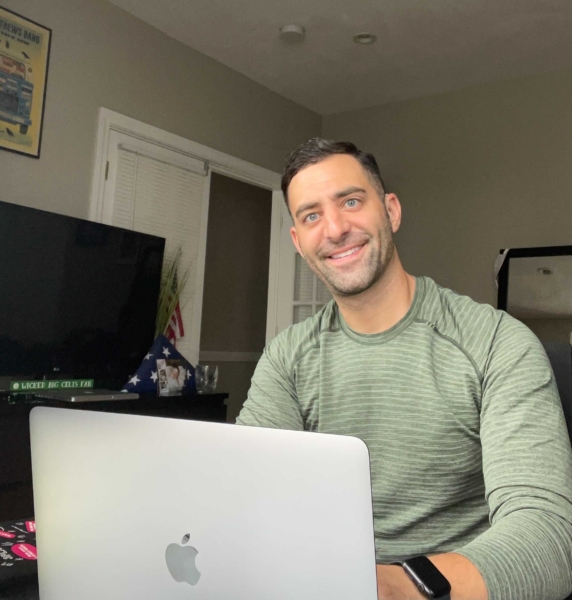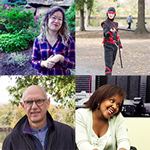Faces Behind the Screen: Dustin Feldman
Quick Links
<< Return to all “Faces Behind the Screen” stories
Dustin Feldman is a sales professional, accessibility and brand evangelist, and passionate 3Play Media team member who has had profound hearing loss since he was five years old.
Dustin has dedicated himself to many different trades and currently focuses on assisting the Higher Education world at 3Play Media. Previously, Dustin spent two years in commercial office furniture sales, four years in specialty paint coatings sales at IdeaPaint, and three years in custom apparel and sponsorship sales.
In addition to his professional work, Dustin is an advocate and guest speaker for collegiate students. He often presents on hearing loss, accessibility, and designing spaces for people with disabilities. Dustin is also the 2021 New England Walk4Hearing “MC.”
Dustin shared with us stories about his childhood, sales career, and life with hearing loss. Watch the video recording below or read the edited interview to learn more about his journey.
Do you identify as deaf, Deaf, or hard-of-hearing?
DUSTIN: All my life, I’ve identified as lowercase deaf and hard-of-hearing. I don’t rely on sign language. I mostly lip-read.
When did you lose your hearing? Can you explain what level of hearing you have?
DUSTIN: It was a gradual decrease where I noticed I started losing my hearing around the age of five years old. I didn’t really even know that I was hard-of-hearing, believe it or not. It was not until I had a hearing exam at school done by the school nurse. One year, I passed with no problem. The next year, they put a board up, and I wasn’t able to read lips. I realized, “Oh, wow! I think I’m losing my hearing.” They told my mom, and I went to get a hearing exam at Children’s Hospital. Sure enough, I had profound high-frequency hearing loss in both ears.
You’re super open and really passionate about hearing loss. Where did your confidence and your passion for advocacy come from?
DUSTIN: Awesome question, and just another thing I love talking about. It’s this man right here [Dustin shows a photo of his grandfather]. This is my grandfather. He had a hook and was a double amputee. What you don’t see in the photo is he had a wooden leg. When he was 26 years old, he was on his friend’s boat. He fell off on a turn, and he hit the propeller. He lost his right hand and his left shin down, so he wore a wooden leg.
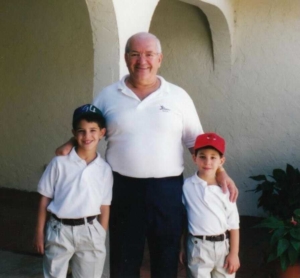
Dustin and his brother as children with their grandfather.
He lived 55, 60 years of nothing but success, professionally, academically, socially, and with his family. He just so happened to be a double amputee. When I realized at 6 years old that I needed hearing aids, I saw them as technology that helped me hear better, and so that’s all it ever was.
Ever since then, I’ve grown more and more confident over the years. There was only one time that I ever got made fun of. I definitely carried the legacy of my grandfather and stayed as confident as I could.
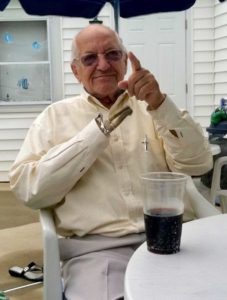
Dustin’s grandfather, who was a double amputee.
How do you use captions, if you use them, and what are your thoughts on bad captioning and using both lip-reading and captioning together?
DUSTIN: I’m the best movie quoter you’ll ever meet! I always read the captions. I love movies and animation. I’ve relied on captions since I was a little kid, which makes me that much more observant and good with reading and vocabulary.
When I’m watching a movie, I’m lip-reading as well, which is very difficult to do because the face is not 3D, and there’s background noise and all sorts of stuff. It takes practice.
But, in short, I’ve relied on closed captions my whole life. That is the reason why I work with 3Play Media now. I looked into this world of closed captions, tech, and artificial intelligence knowing I wanted to join this industry. I specifically chose 3Play Media for a couple of reasons, and that’s accuracy and guaranteed turnaround time, which I know are very important.
Going back to accuracy, there’s nothing worse than bad captions. It was funny when I first heard somebody calls them “craptions.” I got a good giggle out of that. If you have other tools you use, like lip-reading, captions are assistive to fill in what you miss. It’s not like reading a book where you’re reading every single word.
I encourage people to use captions when they watch TV and movies. You don’t want to miss out on the content. It changes the whole meaning of the storyline.
I also love music. My dad was a drummer. My mom was a baton twirler, who has musical genes. I enjoy watching and listening to DVDs of concerts, and putting the subtitles on because it shows the lyrics. If I don’t watch the captions, I might get some words out of it, but I miss out on the meaning of songs. When I see the lyrics, I get emotional. I’m like, “This is what it means?” So there’s something to be said about how important and how powerful captions are, how powerful words are in vocabulary.
How do you feel technology helps or hurts your ability to communicate and navigate the world?
DUSTIN: There’s a lot out there that helps. I’m always looking for new technology that will help me in different scenarios. I just downloaded a new app that’s called Olelo. You call through that app, and it pulls up the captions. It’s not 100% accurate, but it helps.
What I need, and I think the world needs, is more live captioning in different scenarios. An example of this is when the 3Play team went on a trolley tour through Boston for Black Heritage Month. The guide had a mask on, and the speakers weren’t very good. We couldn’t really hear or understand what was being said.
Another thing is assistive listening devices. I’ve got a little microphone that, if you and I were on a walk, I could give it to you and a Bluetooth directly to my ears. Right now, I’m using a Bluetooth adapter to plug into my laptop called the TV Connector, which also plugs into the TV. I can hear directly what’s happening on the TV or the laptop, which is amazing.
There are also other adapters such as the Roger. The Roger is a little circular device that you can put in a conference room, and it points to all the directions where there might be people. If there’s nobody on one side, you can click that side so that it’s facing that direction to grab the volume through a Bluetooth connection to my ears.
Back in school, I used an FM system. I would give my teachers and professors this microphone that they would wear and they would talk into, and it would connect to my hearing aids up to about 75 feet. So I was always sitting in the front and participating in class.
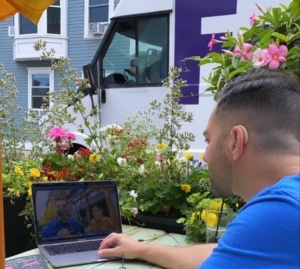
Dustin editing a video for LinkedIn.
What are some things that website, tech, or content creators can do better to be more accessible?
DUSTIN: If you’ve seen Google’s commercials, they do a good job at highlighting people with hearing loss and showing the impact it has on the world. Those videos have millions of views. Amazon also did it. So there’s so much more focus nowadays on accessibility, the deaf and hard-of-hearing industry and community. Facebook launched DeafHoops, a basketball league where you can find Deaf people in your area and play basketball with them. I’m a basketball player so this is extremely immersive.
The only thing I would say, going back to your question, is to do more. More. And I’ll tell you what: it makes all of us better human beings. If I was to have perfect hearing all of a sudden, it would be cool, but I don’t think I would want it. The perspective I have being hard-of-hearing makes me, I like to say, a great person. So I would say, do more, and bring us all together.
Can you talk about your career prior to 3Play and your academic years? Did you ever take online courses or have videos as part of your courses and need specific accommodations? What was your experience like as a student?
DUSTIN: Great question, and something I’m really starting to look back on. I worked closely with the disability services group at the University of New Hampshire. It was up to me to be responsible to advocate for myself. I took advantage of note-takers. I had somebody in my class who took those notes and then published them on the web for students with hearing loss.
Now working for 3Play Media, I have a mission to help as many disability services groups at universities, colleges, and community colleges all over the country be more accessible for their students with disabilities. Captioning, transcription, audio description—all of these services that we provide at 3Play Media, I didn’t have at UNH. So I now have a personal mission to make these services available for students.
If you look under my LinkedIn name, my headline says: “Being hard-of-hearing allows me to listen and be a passionate solution seller.” I’m in sales, but it’s really the educational side of sales. Selling comes naturally to me once I discover the right customer. My goal isn’t to sell to make money, though. It’s to sell to educate people, to make sure that they know what’s out there and if it’s going to help another wave of people be innovative for their own company. When all these people have captions or a transcript, the sky’s the limit.
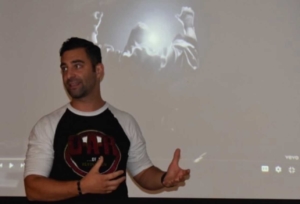
Dustin giving a presentation on accessibility and hearing loss.
Do you need any sort of accommodations in your career and current job? How have the other companies that you’ve worked for handled accommodations?
DUSTIN: Just the other day, I realized for the first time in my career that I’m working with a company that is all about accessibility, diversity, and inclusion. 3Play has really helped me seek those things that I don’t know, what I need in different scenarios. At my previous companies, there really wasn’t much help. I had to take responsibility on my own to help myself. I was offered help, but I kind of ran with it on my own and thought I had the help I needed.
At my previous jobs, I used to use a telephone system called CaptionCall, which is provided by the government. That was helpful in hearing shipping addresses, phone numbers, other referrals, names of people, proper pronouns, but it wasn’t perfect. Now that the world is becoming so virtual, I am all about screen time. Sure, Zoom fatigue is real, but it helps me. I’m hungry enough to stay on the line and stay on the screen throughout the day.
What are some common mistakes that people make when they’re interacting with someone who’s hard-of-hearing? What can people do better to make the interaction better?
DUSTIN: There are some tricks and tips. You never want to scream at somebody. You never want to get mad about them not being able to hear. You really want to get their attention by waving or flagging them down, and then they’ll open their shoulders and look at you. Clapping doesn’t always help. Stomping on the ground, believe it or not, can help at times because you’re feeling the vibration. If you’re at a table, you can tap on the table as well and get their attention. If you’re behind the person, you can tap them lightly on the shoulder.
What is your favorite thing about being hard-of-hearing?
DUSTIN: One of the great stories that I have from my college days is being able to lip-read across a restaurant or a bar. I used to walk into the bar with my buddies. One was Dan, who was also my note-taker. He’s 6′ 5″ so it was easy to see him. And he’s a good-looking guy, so a lot of the women would say, “Oh, that tall guy’s cute.” I would read their lips and say, “Hey, Dan, 6 o’clock, right there [LAUGHING].” I was a good wingman.
Lip reading is certainly a skill that is fun and helpful. Sometimes, if somebody’s far away and there’s a lot of background noise, I can still communicate. Or if people are trying to tell me a secret, and I’m like, “Don’t use voice, just move your lips.” I’ll still be able to understand what they’re saying.
But on the flip side, when we used to play the game telephone, I ruined it every time. [CHUCKLING].
What advice would you give to a parent whose child finds out they have hearing loss?
DUSTIN: I love being a resource to young parents. A lot of my friends are having kids, and they’re reaching out on behalf of friends of friends, and it warms my heart. And I want to be there for them. There are so many resources they can look into to start thinking about accommodations.
There’s a lot out there, but it’s scary. When my parents first realized I was hard-of-hearing, they didn’t know what to do. No one in the family was deaf or hard-of-hearing, so it was new to them just as it was new to me.
They had questions, and they connected with different organizations. They went to my IEP meetings in school to meet the teachers, go over my audiogram, and how to keep me engaged and learning. Their involvement was super helpful, so I definitely encourage young families with young kids to seek out resources because there are so many.
There is a wide range of opinions in d/Deaf and hard-of-hearing communities. As someone who doesn’t necessarily use ASL and who relies on lip-reading, have you ever experienced being made to feel like you weren’t deaf enough?
DUSTIN: I would say no. However, there are so many different groups, like you mentioned. I use my hearing so well and I lip read so well that, at times, even my best friends say that I’ve been faking it the whole time. [CHUCKLING] It’s not an insult, but it’s almost like, if you only knew how hard I work on a daily basis, and you don’t even realize it. I do so many things to accommodate myself, and you don’t even realize it. That’s tiring.
But there are different buckets of hearing loss and different ways people identify themselves. It can be controversial as some people support medicine for hearing loss. And people might think, why would you make someone’s hearing perfect where they could grow up and be this activist on hearing loss and be such a great person? And I see that, but just like anything in life, there are options. There’s this medicine, hearing aids, or ASL, so I get the controversy, but I also back up everybody’s mission and purpose.
You mentioned earlier that you could think of one time when you were made fun of for your hearing loss. Are you willing to share that?
DUSTIN: I’m always comfortable sharing that. I was at my dad’s cousin’s son’s bar mitzvah. I’d never met them before, and I was seven years old, so I was still new to wearing hearing aids.
I was sitting at the kids’ table, and all of the kids there were making fun of my hearing aids. They were calling me balloon ears because, back in the day, they were a lot bigger than they are now. My brother recognized they were making fun of me, but I was eating my food and had no idea. All of a sudden I realized it. I read their lips and saw “balloon ears.” As soon as I saw that, I just started crying. I ran over to my parents and my cousin’s mother came over and asked what happened, so I said they were making fun of me. Everything got taken care of.
Ever since that moment, I was on offense. I didn’t allow for that opportunity to come up really ever again, maybe once in a blue moon. It’s funny because I brought it up to my mom a year ago, and she remembered it. It was very memorable for me and my parents.
Is there anything else you’d like to share?
DUSTIN: I love being a resource to people. If you come across anybody within the 3Play network who wants to chat, or if anyone sees this interview and wants to set up a speaking engagement with their company, I’m very open to doing that. Talks like that are fun for me. I used to do it at the University of New Hampshire for speech pathologists and audiologists. I just want to put myself out there as much as I can and be the motivational speaker that I know I can be.
Faces Behind the Screen would like to thank Dustin Feldman for participating in our storytelling project. If you’re interested in sharing your story with us, fill out our nomination form.
Faces Behind the Screen is a storytelling project focusing on members of the Deaf and hard of hearing community.


